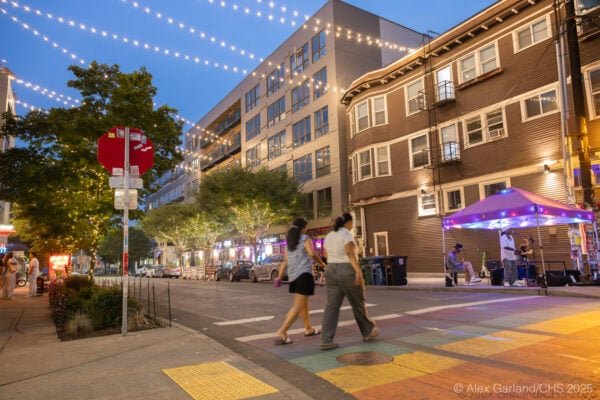Embroiled in a heated race for her office as City Hall incumbents face strong progressive challengers headed into November, City Attorney Ann Davison says Seattle’s “Stay Out of Drug Area” banishment zones that she and Mayor Bruce Harrell championed are working and that the Capitol HIll SODA now leads the city in orders restricting defendants from entering the area.
The Capitol Hill SODA currently is subject to 41 individual orders, Davison told the Seattle CIty Council in a public safety briefing (PDF) Tuesday, leading even the busy downtown zone where 26 orders have been issued.
Tuesday, Davison said the bottom line goals of the SODA program she championed are simple — “to disrupt open air drug markets.”
“If we just see less of the activity, they are working,” Davison said.
In Tuesday’s briefing, Davison said her office is also beginning to receive cases involving the first violations of SODA orders since the new zones went into effect over the past year but that, so far, violations of the orders appears to be a rarity.
In her first race as the incumbent, Davison is playing catch-up with political newcomer Erika Evans, a former federal prosecutor who has emphasized her record as a civil rights prosecutor with a dedication to public service and personal experience with poverty.
“SODA and SOAP zones do not reduce crime or improve outcomes,” Evans answered in a Downtown Seattle Association chamber of commerce candidate questionnaire. “They are ineffective and just displace people in crisis and push them further from services. That’s not real safety.”
The increase in SODA orders follows a slow start for the program. CHS reported in March on the slow trickle of court-ordered banishments as a second defendant was ordered to stay clear of the Capitol Hill zone.
Davison said Tuesday that SODA “took some time to implement for officers” but that the Seattle Police Department is now lined up to put the SODA laws fully to use.
CHS reported here on the Seattle City Council approval of the SODA and Stay Out of Area Prostitution zones in September 2024.
The new zones are on Capitol Hill, and in the International District, Belltown, the University District, and Pioneer Square with the new SOAP zone covering Aurora. More could be added.

Under the legislation, a designation allows a judge to bar drug or prostitution law offenders busted in a zone from reentering the area for up to two years. A SODA or SOAP order can also be imposed as a condition of release from jail. Violating an order will become a new gross misdemeanor, punishable by up to 364 days in jail and a $5,000 fine.
The Seattle City Attorney’s Office says the process begins with police, with a spokesperson telling CHS its office receives referrals from SPD and reviews the referrals “to determine if there are sufficient legal grounds to move the case forward.”
District 3 representative Joy Hollingsworth drove the effort to add a Capitol Hill SODA zone. The restrictions are “established as the area of the Capitol Hill neighborhood bordered on the north by East Thomas Street, on the south by East Union Street, on the east by 11th Avenue, and on the west by Harvard Avenue.”
It includes Cal Anderson, the busy Capitol Hill Station light rail and transit facility, and the areas around the Harvard Market shopping center as well as the core of the Pike/Pine nightlife scene.
The zone also touches the Broadway and Union site where officials are planning a $56 million Broadway Crisis Care Center as part of a network of five emergency mental health facilities across the county.
The Capitol Hill SODA is part of what Hollingsworth has said will be multiple efforts to address crime, drug use, and homelessness around the Broadway and Pike/Pine core including investments “reinvigorating” Cal Anderson Park.
Hollingsworth has said her office is pursuing a similar program to the $15 million-a-year Downtown Seattle Association’s ambassador program up into Pike/Pine that would put workers onto streets to help keep sidewalks and alleys clean and deal with low level public safety issues.
That program could be paid for by fees levied on nearby businesses and properties under a possible Pike/Pine Improvement Area.
This week, meanwhile, the City Council approved a new $400,000 closed circuit camera system to be deployed around Pike/Pine as part of the Seattle Police Department Real Time Crime Center.
Other, smaller efforts have also been implemented. Above 11th Ave where a deadly October 2024 shooting took the life of a 25-year-old, the city has funded new strings of catenary lights hoped to improve safety on the street just off the Pike/Pine core.

 $5 A MONTH TO HELP KEEP CHS PAYWALL-FREE
$5 A MONTH TO HELP KEEP CHS PAYWALL-FREE
🌈🐣🌼🌷🌱🌳🌾🍀🍃🦔🐇🐝🐑🌞🌻
Subscribe to CHS to help us hire writers and photographers to cover the neighborhood. CHS is a pay what you can community news site with no required sign-in or paywall. To stay that way, we need you.
Become a subscriber to help us cover the neighborhood for $5 a month — or choose your level of support 👍




